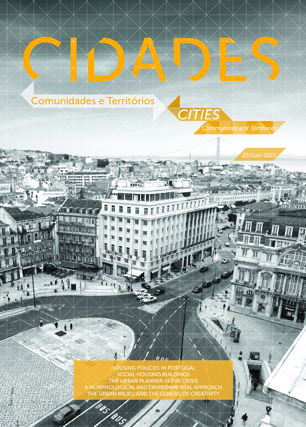O urbanista na crise: Face às diferentes percepções da cidade
Palavras-chave:
Urbanista, Mediador, Negociador, Modelo de Cidade, Participação PúblicaResumo
A crise económica reforçou a necessidade de cruzar informação e procurar novas alternativas. O desempenho dos planeadores e urbanistas é primordial. É urgente reactivar a função social da profissão e reconhecer que o direito à cidade é universal. O desenho urbano resulta de decisões políticas e técnicas. As cidades são habitadas por uma mole não homogénea de cidadãos. Importa perceber onde convergem e divergem as representações de cada grupo relativamente ao “modelo” de cidade. Sendo a participação pública o instrumento de auscultação das vontades populares interessa compreender que convergências e divergências existirão nas representações e percepções de cada um dos grupos envolvidos. Usou-se como estudo de caso o Programa Polis em Vila Nova de Gaia - Portugal. Inquiriram-se políticos, técnicos e cidadãos sobre o conceito de qualidade de vida urbana, o “modelo” de cidade ideal e a importância da participação pública nas decisões urbanísticas. Aplicaram-se simultaneamente técnicas quantitativas e qualitativas. Sobre o conceito de qualidade de vida urbana encontraram-se divergências entre técnicos, políticos e cidadãos e convergência entre géneros e perfil académico. Na descrição da cidade ideal, políticos, técnicos e cidadãos partilham a mesma visão, os géneros divergem. É consensual a importância da participação. A escassez de participação dos cidadãos é justificada através da falta de estímulo por parte das entidades competentes, em paralelo com o desinteresse pela temática.Em síntese, os resultados comprovam a necessidade do diálogo como instrumento da construção de cidades mais equitativas e inclusivas. Aos urbanistas compete o papel de mediadores e negociadores, comprometidos e informados.
Downloads
Publicado
Edição
Secção
Licença
Cidades, Comunidades e Territórios by DINÂMIA'CET-IUL is licensed under a Creative Commons Atribuição-Uso Não-Comercial-Proibição de realização de Obras Derivadas 4.0 Unported License.Permissions beyond the scope of this license may be available at mailto:cidades.dinamiacet@iscte.pt.







